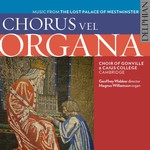
Chorus vel Organa: music from the lost Palace of Westminster
 $35.00
Out of Stock
$35.00
Out of Stock6+ weeks add to cart
NICHOLAS LUDFORD / JOHN SHEPPARD / WILLIAM CORNYSH
Chorus vel Organa: music from the lost Palace of Westminster
Choir of Gonville & Caius College, Cambridge, Geoffrey Webber
[ Delphian / CD ]
Release Date: Friday 20 May 2016
This item is currently out of stock. It may take 6 or more weeks to obtain from when you place your order as this is a specialist product.
Great Britain's modern Houses of Parliament conceal a lost royal foundation: the chapel of St Stephen, begun by Edward I and raised into a college by his grandson Edward III. The foundation maintained an outstanding musical
tradition for almost exactly two hundred years before the college was dissolved in 1548, when the building became the first permanent meeting-place of the House of Commons. This recording reflects the musical life of the college in its final years under Henry VIII, and reconstructs both the wide range of singing practices in the great chapels and cathedrals and the hitherto largely unexplored place of organ music in the pre-Reformation period.
The repertoire of music chosen reflects the chapel's dedication to St Stephen, and the disc also features three items from the Caius Choirbook - a handsomely illuminated manuscript, once owned by a canon at St Stephen's, which now resides in Gonville & Caius College, Cambridge.
"Webber and the Choir of Gonville & Caius College, Cambridge with Magnus Williamson remind us of the riches of the Lost Palace of Westminster. The sound of that reconstructed 16th-century chamber organ adds a highly distinctive character to the sound. And the speculative interweaving of voices and organ feels perfectly plausible. The recording is impeccable." (Record Review)
"Deep research and fierce musical intelligence underpin this project... Director Geoffrey Webber gets a robust and highly musical reading from his Cambridge vocalists." (BBC Music)
"a wholly uplifting experience musically, enhanced by Delphian's high production standards." (Choir & Organ Five Stars)
"There is much to be celebrated here as early music scholarship inspires joyful performances from the Choir of Gonville & Caius College…it is surely testament to the rich heritage of British vocal performance that young singers can assimilate these styles so quickly and expertly. If ever there was a moment to bask in the achievements of the early music revival and gaze in wonderment at its promising future, then this is it" Gramophone
Tracks:
1. anon. (1519 Sarum Antiphoner)
Processional: Sancte Dei pretiose [05.09]
2. Nicholas Ludford (c.1485-c.1557)
Missa Lapidaverunt Stephanum - Gloria† [08.08]
3. anon., c.1530
Offertory: Felix namque [04.07]
4. Nicholas Ludford
Lady Mass Cycle vi (Friday) - Alleluia. Salve Virgo
[03.00]
5. Nicholas Ludford*
Lady Mass Cycle iii (Tuesday) - Kyrie [04.33]
6. William Cornysh (1465-1523)
Magnificat† [12.17]
7. Nicholas Ludford*
Lady Mass Cycle iv (Wednesday) - Laetabundus
[08.23]
8. Nicholas Ludford
Lady Mass Cycle v (Thursday) - Agnus Dei
[04.15]
9. John Sheppard (c.1515-1558)
Hymn: Sancte Dei pretiose
[03.21]
10. Nicholas Ludford*
Lady Mass Cycle ii (Monday) - Gloria
[06.31]
11. Nicholas Ludford
Missa Lapidaverunt Stephanum - Agnus Dei†
[07.06]
* with organ versets devised 'upon the Squares' by Magnus Williamson
Items marked † are from the Caius Choirbook



